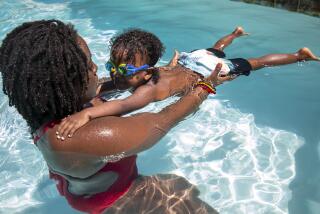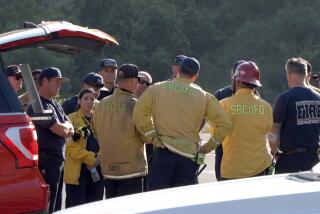Few Answers for Grieving Parents of ‘Drownders’
- Share via
The season has begun for “drownders”--the name doctors and nurses have for children fished out of back-yard pools after seconds or minutes without air and brought to the county’s emergency rooms.
Of all the children brought in after accidents, the “drownders” bring the most guilt and the fewest answers for grief-stricken parents, said staff members at Western Medical Center in Santa Ana, which in the last 2 weeks has received four such victims--
including two of the three toddlers who fell in a North Tustin baby-sitter’s pool Thursday.
For nurses and social workers who are trained to fix things, as well as for parents in a state of shock, “the emotion is incredible,” said Debbie Simpson, the hospital’s clinical coordinator of the Pediatric Intensive Care Unit.
Priests and chaplains are available on call, but it is the nurses and the staff social workers who are there when parents arrive and, universally, want to see their child. They are led to a still form nearly obscured by machines, and they inevitably ask, Simpson said, “where their kid is.”
“I feel like someone has grabbed their heart out,” she said.
Desiree Brown, a staff social worker who helps families sort through the tragedy, said some parents will tell her their child will wake up tomorrow, smiling and laughing the way they last saw him. The grief and the amount of disbelief, she said, are indescribable. “The frustrating part is they can’t reverse it.”
The swollen brains of drowning and near-drowning victims produce a “diffused” injury that makes questions of life, death or quality of life after recovery unpredictable, Simpson said.
Improved technology allows the highly trained staff to resuscitate more than half the victims who come in. And of those who survive, no two respond alike to therapy.
“Some have very minimal function,” Simpson said. As a result, she added, nurses have no answers for parents desperately seeking them.
“It’s scary for me, talking to the families, to get close emotionally,” she said. “There’s a fine line there. If you feel too much, can you gather it up and take care of the kid?”
At night, she and other nurses said, they often go home and cry.
Social worker Brown said the tragedy involving a child can drive some parents to divorce, blaming each other. It can bring some families together in their sorrow. But even the seemingly strongest couples often end up separated months or years later, she said.
Nurses said they’re not tempted to judge parents after the cases they’ve seen: the mother who turned away to plant a flower, only to miss seeing her child fall in the pool; the 3-year-old who opened a wooden cover of a Jacuzzi for his 18-month-old sister, who crawled in.
Three “drownders” she’s seen had taken swimming lessons, said Simpson, who wears a button reading “Kids Are Special People” and gives lessons in pediatric cardiopulmonary resuscitation.
“Personally,” Simpson said, “I wish for parents of that kid, that they could release the guilt they have. Some are good at it and some are not. They live with that guilt.”
More to Read
Sign up for Essential California
The most important California stories and recommendations in your inbox every morning.
You may occasionally receive promotional content from the Los Angeles Times.













